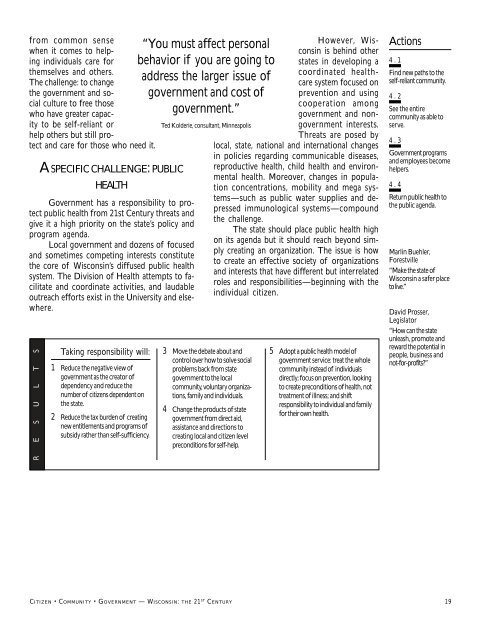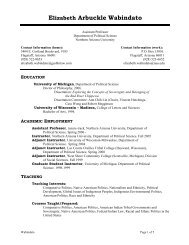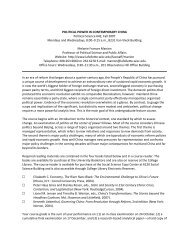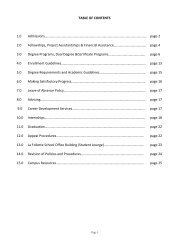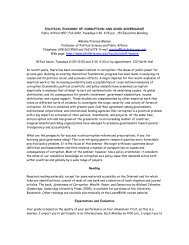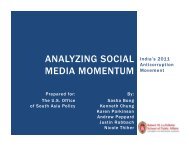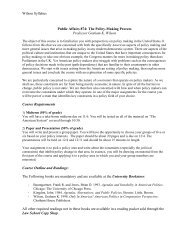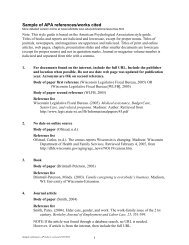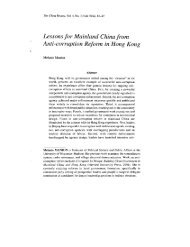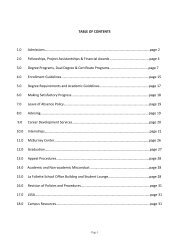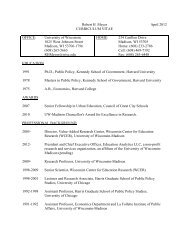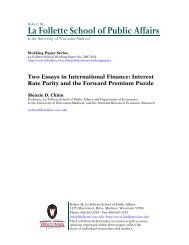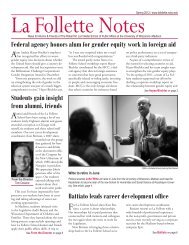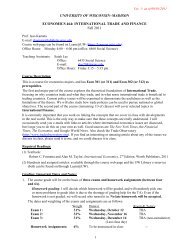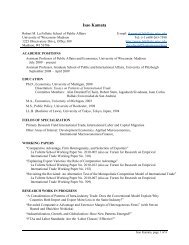SAVE Commission's findings - La Follette School of Public Affairs ...
SAVE Commission's findings - La Follette School of Public Affairs ...
SAVE Commission's findings - La Follette School of Public Affairs ...
You also want an ePaper? Increase the reach of your titles
YUMPU automatically turns print PDFs into web optimized ePapers that Google loves.
from common sense<br />
when it comes to helping<br />
individuals care for<br />
themselves and others.<br />
The challenge: to change<br />
the government and social<br />
culture to free those<br />
who have greater capacity<br />
to be self-reliant or<br />
help others but still protect<br />
and care for those who need it.<br />
A SPECIFIC CHALLENGE: PUBLIC<br />
HEALTH<br />
Government has a responsibility to protect<br />
public health from 21st Century threats and<br />
give it a high priority on the state’s policy and<br />
program agenda.<br />
Local government and dozens <strong>of</strong> focused<br />
and sometimes competing interests constitute<br />
the core <strong>of</strong> Wisconsin’s diffused public health<br />
system. The Division <strong>of</strong> Health attempts to facilitate<br />
and coordinate activities, and laudable<br />
outreach efforts exist in the University and elsewhere.<br />
R E S U L T S<br />
Taking responsibility will:<br />
1 Reduce the negative view <strong>of</strong><br />
government as the creator <strong>of</strong><br />
dependency and reduce the<br />
number <strong>of</strong> citizens dependent on<br />
the state.<br />
2 Reduce the tax burden <strong>of</strong> creating<br />
new entitlements and programs <strong>of</strong><br />
subsidy rather than self-sufficiency.<br />
“You must affect personal<br />
behavior if you are going to<br />
address the larger issue <strong>of</strong><br />
government and cost <strong>of</strong><br />
government.”<br />
Ted Kolderie, consultant, Minneapolis<br />
3 Move the debate about and<br />
control over how to solve social<br />
problems back from state<br />
government to the local<br />
community, voluntary organizations,<br />
family and individuals.<br />
4 Change the products <strong>of</strong> state<br />
government from direct aid,<br />
assistance and directions to<br />
creating local and citizen level<br />
preconditions for self-help.<br />
However, Wisconsin<br />
is behind other<br />
states in developing a<br />
coordinated healthcare<br />
system focused on<br />
prevention and using<br />
cooperation among<br />
government and nongovernment<br />
interests.<br />
Threats are posed by<br />
local, state, national and international changes<br />
in policies regarding communicable diseases,<br />
reproductive health, child health and environmental<br />
health. Moreover, changes in population<br />
concentrations, mobility and mega systems—such<br />
as public water supplies and depressed<br />
immunological systems—compound<br />
the challenge.<br />
The state should place public health high<br />
on its agenda but it should reach beyond simply<br />
creating an organization. The issue is how<br />
to create an effective society <strong>of</strong> organizations<br />
and interests that have different but interrelated<br />
roles and responsibilities—beginning with the<br />
individual citizen.<br />
5 Adopt a public health model <strong>of</strong><br />
government service: treat the whole<br />
community instead <strong>of</strong> individuals<br />
directly; focus on prevention, looking<br />
to create preconditions <strong>of</strong> health, not<br />
treatment <strong>of</strong> illness; and shift<br />
responsibility to individual and family<br />
for their own health.<br />
Actions<br />
4.1<br />
Find new paths to the<br />
self-reliant community.<br />
4.2<br />
See the entire<br />
community as able to<br />
serve.<br />
4.3<br />
Government programs<br />
and employees become<br />
helpers.<br />
4.4<br />
Return public health to<br />
the public agenda.<br />
Marlin Buehler,<br />
Forestville<br />
“Make the state <strong>of</strong><br />
Wisconsin a safer place<br />
to live.”<br />
David Prosser,<br />
Legislator<br />
“How can the state<br />
unleash, promote and<br />
reward the potential in<br />
people, business and<br />
not-for-pr<strong>of</strong>its?”<br />
CITIZEN • COMMUNITY • GOVERNMENT — WISCONSIN: THE 21 ST CENTURY 19


